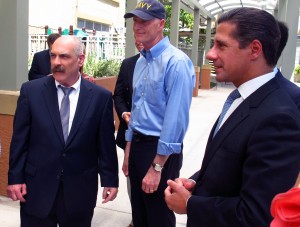Miami-Dade Schools Chief Wants To Delay New Testing, School Grades

John O'Connor / StateImpact Florida
Miami-Dade superintendent Alberto Carvalho, from right, Gov. Rick Scott and Southside Elementary principal Salvatore Schiavone tour the school last month.
Miami-Dade superintendent Alberto Carvalho said Florida leaders should rethink the scope and purpose of education testing and give schools more time to prepare for new math and language arts standards.
Carvalho’s proposal was published online and emailed to reporters. Carvalho has also been tweeting excerpts since Monday.
Carvalho draws a hard line at eliminating testing, even as some Florida school districts float the idea of boycotting state-required exams.
“Respectful accountability is a data tool of truth that enables and empowers appropriate intervention,” Carvalho wrote. “Simply relying on an “impression” of achievement is not enough, as history has taught us.”
Score averages can’t cover up lagging students if everyone is tested, Carvalho wrote.
Relying on “impression” of achievement is not enough as history has taught us. Majority performance often cloaks pockets of underperformance
— Alberto M. Carvalho (@MiamiSup) September 1, 2014
But, the superintendent argued that the state’s school accountability system’s credibility is at risk without some changes. Carvalho proposed five:
More flexibility with federal rules — Florida’s dispute with the federal government over the testing of English language learners is an example where federal requirements conflict with local expertise.
An extra year — test-free — to prepare for Florida’s new standards — An extra year will give schools more time to train teachers and to teach parents, students and the community about the new math and language arts standards, Carvalho argued.
Let’s recognize that we are not going to assess our way to excellence; failing to assess altogether is guaranteeing we will never get there.
— Alberto M. Carvalho (@MiamiSup) September 1, 2014
Make sure Florida’s new test works — Florida decided to develop its own test rather than use one of two exams developed by groups of states with federal money. Carvalho said the state needs to make sure the test results are valid and reliable. The state should also review testing requirements to make sure students aren’t overburdened.
No consequences for two years — The state should suspend any decisions based on school grades, including restaffing schools with low grades and paying bonuses for schools earning good grades.
No grades this year — Schools won’t face any consequences from this year’s state grades. But Carvalho argued the state shouldn’t issue grades with the new test results. Because part of the school grading formula relies on how much students have improved year-over-year, he said comparing results on the new test to previous FCAT results will result in “indefensible or baseless grades.”
Delay use of tests for teacher evaluations — Again, since student year-to-year improvement would use different tests, Carvalho argued the state can’t use those results to determine how effective a teacher is. To do so, he wrote, “is questionable at best, unethical at worst.”
On Florida’s accountability and assessment plan: simply getting it done cannot be a cheap, expedited substitute for getting it done right.
— Alberto M. Carvalho (@MiamiSup) September 1, 2014
Florida’s statewide superintendents association asked for an additional three years to prepare for the new Common Core-based standards last year. But lawmakers and state education officials declined the idea.
